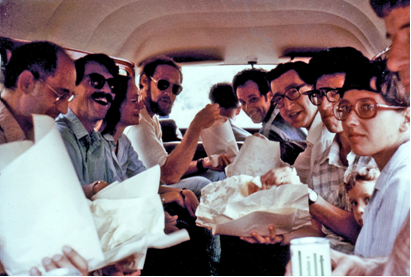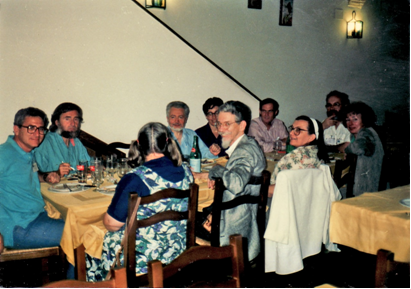 The website is in construction. New files will be uploaded as soon as they are available.
The website is in construction. New files will be uploaded as soon as they are available.
PME
International Group for the Psychology of Mathematics Education
A brief history of the International Group for the Psychology of Mathematics Education (PME)

- A brief history
- Citations
- Numbers of members of PME and participants at conferences
- PME Group Presidents: Past and Current
- Publications Encouraged by the PME Group
- Participants (84) in 1977 Utrecht, The Netherlands
- PME members in 1977
Written and complied by
| Cynthia Nicol and Steve Lerman with assistance from Joop van Dormolen, Carolyn Kieran, Gerard Vergnaud, Kath Hart and Heinrich Bauersfeld - March 2008. |
A brief history
The International Group for the Psychology of Mathematics Education was born in 1976 with approximately 100 participants under the guidance and inspiration of Efraim Fischbein. The impetus to develop an organization with a psychological focus on mathematics education began much earlier when, in 1969 at the first International Congress on Mathematics Education ([ICME], Lyons, France), Fischbein was invited by then ICME president Hans Freudenthal to chair and organize a round table on the psychological problems of mathematics education. Fischbein, a cognitive psychologist and, at that time head of the department of Educational Psychology at the University of Bucharest (later he served as head of the Science Education Department at Tel Aviv University), was keen to take up Freudenthal's call to improve mathematics education in schools by going beyond philosophical discussions of mathematics teaching and learning to advocating empirical scientific research in the field.
The Group has a name
Professor Fischbein proposed to members in 1976 that the group be called "The International Group for the Psychology of Mathematics Education" (IGPME) to distance it from Professor Zoltan Dienes' group that was called "The International Study Group for Mathematics Learning". In 1979 Professor Hartwig Meissner proposed that the abbreviation be IPM. Official acceptance of the abbreviation PME occurred at the Group meeting in 1980, (Berkeley, USA) with the final version of the Constitution.
Professor Fischbein proposed to members in 1976 that the group be called "The International Group for the Psychology of Mathematics Education" (IGPME) to distance it from Professor Zoltan Dienes' group that was called "The International Study Group for Mathematics Learning". In 1979 Professor Hartwig Meissner proposed that the abbreviation be IPM. Official acceptance of the abbreviation PME occurred at the Group meeting in 1980, (Berkeley, USA) with the final version of the Constitution.
Participants attending this first round table were keen to continue the discussion on psychological aspects of mathematics education. A working group dedicated to the psychology of mathematics education was organized and offered at the second ICME in 1972 (Exeter, Great Britain). Hundreds of participants attended that workshop recognizing, as Fischbein did, "that the psychological problems of mathematical learning and reasoning are scientifically exciting and at the same time genuinely relevant for mathematics education" (Fischbein, 1990, p. 4). Four years later at ICME in 1976 (Karlsruhe, Germany) participants decided to organize a permanent group that would meet yearly to discuss and explore issues related to the psychology of mathematics education. And so began the International Group for the Psychology of Mathematics Education (PME) with Fischbein as first president and Richard Skemp as second president four years later in 1980.
Freudenthal's psychology of mathematics education
The kind of psychology of mathematics education Freudenthal had in mind was influenced by his mathematical and logical experiments and experiences with grandson Bastiaan. At his opening address at the first PME in Utrecht he defined this kind of psychological research: You need a strategy of observing - a highly sophisticate strategy, but which can be expressed in one principle: Look and listen with an open mind and have the courage to notice and to report events that most people would consider as too silly to be noticed and to be reported - there might be a minority who can appreciate them, and this minority will be right." (Freudenthal, Opening Address of PME 1, Utrecht, The Netherlands 1977)
The kind of psychology of mathematics education Freudenthal had in mind was influenced by his mathematical and logical experiments and experiences with grandson Bastiaan. At his opening address at the first PME in Utrecht he defined this kind of psychological research: You need a strategy of observing - a highly sophisticate strategy, but which can be expressed in one principle: Look and listen with an open mind and have the courage to notice and to report events that most people would consider as too silly to be noticed and to be reported - there might be a minority who can appreciate them, and this minority will be right." (Freudenthal, Opening Address of PME 1, Utrecht, The Netherlands 1977)
Guidelines for the development of the PME International Committee were agreed upon in 1978 at PME 2 (Osnabrück, Germany). It was decided that (i) the Committee should consist of 16 elected members, 4 of whom should retire each year, (ii) that retiring members should not be eligible for re-election for the subsequent year, (iii) that the Officers (e.g. President, Treasurer, Secretary) should be chosen by the Committee from among its elected members and (iv) that members retire upon 4 years of service. This continues to be the guideline for the international organization of the Group. The first PME Constitution was adopted by the Annual General Meeting in 1980 (Berkeley, USA) with a focus on "the following categories of communications:
- General theoretical problems concerning the relation between psychology as a science and mathematics education
- Communications presenting experimental interdisciplinary research
- Psychological training for teachers.

PME 1979, Warwick.
On the left: Ben Knip, Gérard Vergnaud, who together with Alan Bell and Hartwig Meissner designed the constitution of PME, an unknown lady, Dick Lesh, David Tall, Josette Adda, Uwe Bong. Inside, at the time were Hans Freudenthal, Shlomo Vinner, Francis Loewenthal and others.
PME 3 (Warwick UK 1979) conference themes
- The process of understanding in mathematical learning
- Instruction and creativity
- Social dimensions of mathematical learning
- Learning hierarchies
- Mathematical thinking
- Mathematical abilities and their development
- Space and geometry
- Attitudes and affective aspects
- Problem solving
- Developmental psychology and implications for teaching

Richard Skemp
PME 2 (Osnabrück, Germany) conference themes
Themes and committee members that led the PME 2 in 1978:
Themes and committee members that led the PME 2 in 1978:
- Acquisition of arithmetical concepts (R. Rees & G. Vergnaud);
- Learning of generalisation and proof (A. W. Bell)
- Interpersonal aspects of classroom communication (H. Bauersfeld)
- Nature of mathematical thinking (A. Vermandel & E. Cohors-Fresneborg)
- Intuitive and reflective processes in mathematics (E. Fischbein & R. Skemp)
Currently the trends and collected research in mathematics education for PME have expanded. The 2006 Handbook of Research on the Psychology of Mathematics Education (Gutiérrez & Boero, 2006) is organized around research areas that have had substantial activity in PME. These main PME research domains include: 1) cognitive aspects of learning and teaching mathematical content such as number, algebra, geometry and measurement as well as research in these areas with respect to young children's thinking, advanced mathematical thinking, and visualization; 2) teaching and learning mathematics with technology; 3) social aspects of mathematics education including socio-cultural research, equity, gender, affect, and constructivism.
Including the social dimensions of learning in PME - Heinrich Bauersfeld Remembers
From the very beginning I was unhappy with the exclusive concentration on Psychology only, which meant focusing on the individual and neglecting the social dimensions of the complex teaching-learning processes. Research on the complex problems of learning/teaching-processes and of teaching teachers to teach mathematics will not arrive at helpful constructive information as long as such vast domains as language, human interaction (not the usual psychological interaction of variables!) and rich case studies are neglected and/or treated by inadequate research methods. Usual refusal sounded like: "We have enough to do with psychology!" Freudenthal was interested, and used to ask me accidentally: "What shall I read about it?" But at that time there was neither easy access available nor were there convincing overviews from sociological perspectives.
From the very beginning I was unhappy with the exclusive concentration on Psychology only, which meant focusing on the individual and neglecting the social dimensions of the complex teaching-learning processes. Research on the complex problems of learning/teaching-processes and of teaching teachers to teach mathematics will not arrive at helpful constructive information as long as such vast domains as language, human interaction (not the usual psychological interaction of variables!) and rich case studies are neglected and/or treated by inadequate research methods. Usual refusal sounded like: "We have enough to do with psychology!" Freudenthal was interested, and used to ask me accidentally: "What shall I read about it?" But at that time there was neither easy access available nor were there convincing overviews from sociological perspectives.
As of 2008 the major goals of PME are:
- to promote international contacts and exchange of scientific information in the psychology of mathematical education;
- to promote and stimulate interdisciplinary research in the aforesaid area;
- to further a deeper and more correct understanding of the psychological and other aspects of teaching and learning mathematics and the implications thereof.
Tensions developing the constitution
There were some tensions amongst those drafting the Constitution between 1979 and 1980. Issues that troubled the committee were:
There were some tensions amongst those drafting the Constitution between 1979 and 1980. Issues that troubled the committee were:
- whether all the officers (President, Vice-President, Treasurer and Secretary) should be elected by the Annual General Meeting (AGM) or just some of those officers. The decision was made to elect the President only at the AGM and the other three officers would be elected by the International Committee (IC).
- whether officers could be re-elected after their term of office. It was decided that the President could not be re-elected but that other officers could be elected to offices different from those they had already held.
- whether the term of office of the president would be for two years or more. It was decided that all officers would serve for two years. This was changed to three years for the President during the term of office of Professor Kath Hart between1990 and 1992. Professor Carolyn Kieran was the first to be President for a three year term.
- whether each IC member would be elected for three years or four, with 3 leaving each year or four. The decision was made in favour of four years.
There are currently two forms of groups: working groups that allow for presentations of more established research programs and discussion groups that support discussions of developing research ideas. PME has encouraged working groups to continue their work during the year between Group meetings, and has when possible provided modest funding to support administrative expenses for this work. Working groups receiving such support were encouraged to publish their work (see list of publications below). An interest of the PME International Committee has and continues to include exploring new discussion formats that offer members possibilities for more personal and interactive involvement.

PME 1979, Warwick.
On the bus. Among others Shlomo Vinner, and Dina Tirosh
A question of language
The Working Group on the Psychology of Learning Mathematics which held a meeting at the 3rd International Congress on Mathematical Education in Karlsruhe in August 1976 was pre-occupied with issues of language. Apparently Professor Hans Freudenthal sat in the front row and translated all his own comments from English into French and German and many of the French and French Canadians had to have the English translated, leading to arguments over the correctness of the translations from those who spoke both. The minutes of the meeting of acting committee the 19th November 1979 included the following: Professor Gerard Vergnaud's proposal that the conference language should be English was accepted. The Grenoble conference in 1981 invited papers in French or English. This possibility was repeated at the 1989 conference in Paris.
The Working Group on the Psychology of Learning Mathematics which held a meeting at the 3rd International Congress on Mathematical Education in Karlsruhe in August 1976 was pre-occupied with issues of language. Apparently Professor Hans Freudenthal sat in the front row and translated all his own comments from English into French and German and many of the French and French Canadians had to have the English translated, leading to arguments over the correctness of the translations from those who spoke both. The minutes of the meeting of acting committee the 19th November 1979 included the following: Professor Gerard Vergnaud's proposal that the conference language should be English was accepted. The Grenoble conference in 1981 invited papers in French or English. This possibility was repeated at the 1989 conference in Paris.
In 1994 at PME 18 (Lisbon, Portugal) a sub-group of PME was established to pro-actively strengthen connections and activities with under- and non-represented countries. The sub-group's goals were and continue to include furthering relationships with groups and individuals, providing information about the activities of PME, and facilitating individual participation at PME. Discussion groups at PME conferences over the years examined the political, psychological, financial, linguistic, and scientific issues related to furthering the participation of researchers at under- and non-represented countries. PME continues to be a vibrant organization with over 500 international members contributing to mathematics education worldwide. Published PME conference proceedings are available in hard copy and electronic form. Many proceedings can be retrieved from the Educational Resources Information Centre (ERIC) at www.eric.ed.gov. Future PME conferences include: Morelia Mexico (PME 32 in 2008), Thessaloniki Greece (PME 33 in 2009), and Belo Horizonte Brazil (PME 34 in 2010). For more information please visit the PME website at http://igpme.org/.
Citations
Fischbein, E. (1990). Introduction. In P. Nesher & J. Kilpatrick (Eds.), Mathematics and cognition: A research synthesis by the International Group for the Psychology of Mathematics Education (pp. 1-13). Cambridge: Cambridge University Press.
Gutiérrez, A. & Boero, P. (2006). Handbook of research on the psychology of mathematics education: Past, present and future. The Netherlands: Sense Publishers.

PME 1991, Assisi
From the left: Ted Eisenberg, Jim Kaput, Gontran Ervynck, Dina Tirosh, Tommy Dreyfus, David Tall, Michèle Artigue, Annie and John Selden, Susan Kaput
Numbers of members of PME and participants at conferences
| Number of participants | Number of members | |||
|---|---|---|---|---|
| 2007 | PME31 | Seoul, Korea | 340 | 503 |
| 2006 | PME30 | Prague, Czech Republic | 687 | 901 |
| 2005 | PME29 | Melbourne, Australia | 357 | 640 |
| 2004 | PME28 | Bergen, Norway | 477 | 808 |
| 2003 | PME27 | Honolulu, USA | 479 | 803 |
| 2002 | PME26 | Norwich, United Kingdom | 478 | 680 |
| 2001 | PME25 | Utrecht, The Netherlands | 600 | 817 |
| 2000 | PME24 | Hiroshima, Japan | 370 | 602 |
| 1999 | PME23 | Haifa, Israel | 414 | 682 |
| 1998 | PME22 | Stellenbosch, South Africa | 387 | 681 |
| 1997 | PME21 | Lahti, Finland | 315 | 630 |
| 1996 | PME20 | Valencia, Spain | 445 | 693 |
| 1995 | PME19 | Recife, Brazil | 242 | 555 |
| 1994 | PME18 | Lisbon, Portugal | 388 | 655 |
| 1993 | PME17 | Tsukuba, Japan | 195 | 508 |
| 1992 | PME16 | Durham, USA | 368 | 603 |
| 1991 | PME15 | Assisi, Italy | 190 | 189 |
| 1990 | PME14 | Oaxtepec, Mexico | 185 | 185 |
| 1989 | PME13 | Paris, France | 262 | 262 |
| 1988 | PME12 | Veszprem, Hungary | 241 | 240 |
| 1987 | PME11 | Montreal, Canada | 309 | 312 |
| 1986 | PME10 | London, United Kingdom | 262 | 262 |
| 1985 | PME9 | Noordwijkerhout, The Netherlands | 217 | 212 |
| 1984 | PME8 | Sydney, Australia | 183 | 184 |
| 1983 | PME7 | Shoresh, Israel | 131 | 131 |
| 1982 | PME6 | Antwerpen, Belgium | 144 | 143 |
| 1981 | PME5 | Grenoble, France | 86 | 86 |
| 1980 | PME4 | Berkeley, USA | 81 | 79 |
| 1979 | PME3 | Warwick, United Kingdom | 45 | 45 |
| 1978 | PME2 | Osnabrück, Germany | 70 | 70 |
| 1977 | PME1 | Utrecht, The Netherlands | 84 | 84 |
Note: For the years before 1992 the numbers of participants are uncertain

Budapest 1988.
David Tall and Anna Sfard
David Tall and Anna Sfard
PME Group Presidents: Past and Current
| Efraim Fischbein (Israel) | 1977-1980 |
| Richard Skemp (UK) | 1980-1982 |
| Gérard Vergnaud (France) | 1982-1984 |
| Kevin Francis Collis (Australia) | 1984-1986 |
| Perla Nesher (Israel) | 1986-1988 |
| Nicolas Balacheff (France) | 1988-1990 |
| Kath Hart (UK) | 1990-1992 |
| Carolyn Kieran (Canada) | 1992-1995 |
| Stephen Lerman (UK) | 1995-1998 |
| Gilah Leder (Australia) | 1998-2001 |
| Rina Hershkowitz (Israel) | 2001-2004 |
| Chris Breen (South Africa) | 2004-2007 |
| Fou-Lai Lin (Taiwan) | 2007-2010 |
Publications Encouraged by the PME Group
(e.g., resulting from PME research and working groups)
1990:
Nesher, Pearla & Kilpatrick, Jeremy (Eds.) Mathematics and Cognition: A Research Synthesis by the International Group for the Psychology of Mathematics Education Cognition University Press. ICMI Study Series. Publisher: Cambridge.
1991:
Tall, David (Ed), Advanced Mathematical Thinking. Publisher: Kluwer, Dordrecht
1993:
Bishop, Alan & Hart, Kath & Lerman, Stephen & Nunes, Terezinha Significant Influences on Children's Learning of Mathematics. Document Series No. 47, Education Sector. Publisher: UNESCO, Paris
1997:
Zack, Vicky & Mousley, Judith & Breen, Chris (Eds.) Developing Practice: Teachers Inquiry and Educational Change. Book/Monograph Publisher: Deakin University Press, Melbourne Publication based on PME group: Teachers as researchers.
1998:
Goldin, Gerald & Janvier, Claude (Eds.) PME Working Group on Representations (dedicated to Robert B. Davis). Article in: Journal of Mathematical Behavior (Special Issue), Vol. 17, nos. 1 - 2. Publication based on PME group: Representations.
1999:
Ellerton, Nerida F. (Ed.) Mathematics Teacher Development: International perspectives Book/Monograph. Publisher: Meridian Press. Publication based on PME group: Research on teacher development
1999:
Jaworski, Barbara & Wood, Terry & Dawson, Alexander (Eds.) Mathematics Teacher Education: Critical International Perspectives. Book/Monograph. Publisher: Falmer Press, London. Publication based on PME group: Psychology of inservice.
2000:
Jones, Keith & Gutiérrez, Angel & Mariotti, Maria Alessandra (Eds.) Proof in Dynamic Geometry Environments. PME Special Issue of Educational Studies in Mathematics, 44 (1-2). Publisher: Kluwer, Dordrecht.
2001:
Ainley, Janet & Pratt, Dave (Eds,) Constructing Meaning from Data. PME Special Issue of Educational Studies in Mathematics, 45 (1-2). Publisher: Kluwer, Dordrecht.
2001:
Kieran, Carolyn & Forman, Ellice & Sfard, Anna (Eds.) Bridging the Individual and the Social: Discursive Approaches to Research in Mathematics Education. PME Special Issue of Educational Studies in Mathematics, 46 (1-3). Publisher: Kluwer, Dordrecht (reprinted as a book, Learning Discourse, by Kluwer in 2002). Publication based on plenary panel of 1999 PME Conference.
2002:
English, Lyn & Goodchild, Simon (Eds.) Researching Mathematics Classrooms: A critical examination of methodology. Book/Monograph Publisher: Greenwood. Publishers. Publication based on PME group: Classroom research.
2006:
Gutiérrez, Angel & Boero, Paolo (Eds.) Handbook of research on the psychology of mathematics education: Past, present and futureBook/Monograph. Publisher: Sense Publishers, The Netherlands. Publication based on PME research -- on the occasion of 30th anniversary of PME.
Participants (84) in 1977 Utrecht, The Netherlands
| A | M | ||
| Abele, Albrecht | GERMANY | Machut, T. | GERMANY |
| Adda, Josette | FRANCE | Malet, A. | SPAIN |
| Anger, E. | SWITZERLAND | Marthe, Patrick | FRANCE |
| Audigier, M.N. | FRANCE | Mètrégiste, R. | FRANCE |
| Avital, Shmuel | ISRAEL | Moske, M. | THE NETHERLANDS |
| Movshovitz-Hadar, Nitsa | ISRAEL | ||
| B | N | ||
| Balacheff, Nicolas | FRANCE | Nelissen, J. | THE NETHERLANDS |
| Balzer, W. | GERMANY | Nesher, Pearla | ISRAEL |
| Bauersfeld, Heinrich | GERMANY | Nimier, J. | FRANCE |
| Bell, Alan | UNITED KINGDOM | ||
| Bessot, Annie | FRANCE | ||
| Bong, Uwe | GERMANY | ||
| Broekman, Harrie | THE NETHERLANDS | ||
| Brusseau, Guy | FRANCE | ||
| C | R | ||
| Chevallard, Yves | FRANCE | Radatz, Hendrik | GERMANY |
| Cohors-Fresenborg, Elmar | GERMANY | Rash, B. | GERMANY |
| Colomb, J. | FRANCE | Rees, Ruth | UNITED KINGDOM |
| Comiti, Claude | FRANCE | Rouchier, André | FRANCE |
| D | S | ||
| Darche, N. | FRANCE | Schmidt, Siegbert | GERMANY |
| de Backer, W. | BELGIUM | Schuyten-Plancke, Gilberte | BELGIUM |
| de Leeuw, Leendert | THE NETHERLANDS | Skemp, Richard R. | UNITED KINGDOM |
| Stavy, Ruth | ISRAEL | ||
| E | T | ||
| Ervynck, Gontran J. | BELGIUM | Tall, David | UNITED KINGDOM |
| Troelstra, Rudolf | THE NETHERLANDS | ||
| F | V | ||
| Fischbein, Efraim | ISRAEL | Van Dormolen, Joop | ISRAEL |
| Floyd, Ann | UNITED KINGDOM | van Eerde, Dolly | THE NETHERLANDS |
| Freudenthal, Hans | THE NETHERLANDS | van Stern, H. | GERMANY |
| Frommhold, J. | GERMANY | van 't Riet, S.P. | THE NETHERLANDS |
| van 't Riet, Nol | THE NETHERLANDS | ||
| van Tooren, Arie | THE NETHERLANDS | ||
| Vedder, Jaap | THE NETHERLANDS | ||
| Vergnaud, Gérard | FRANCE | ||
| Vermandel, Alfred | BELGIUM | ||
| Vidal-Madjar, Annie | FRANCE | ||
| Vinner, Shlomo | ISRAEL | ||
| von Stern, Heino | GERMANY | ||
| Vuurmans, A. | THE NETHERLANDS | ||
| G | W | ||
| Gardiner, John | UNITED KINGDOM | Weidner, C. | GERMANY |
| Gjone, Gunner | NORWAY | Weinheimer, B. | GERMANY |
| Glaser, H. | GERMANY | Welmers, H. | THE NETHERLANDS |
| Gras, Régis | FRANCE | Winter, Colin F. | UNITED KINGDOM |
| Guillerault, Michel | FRANCE | Wolters, Miriam A. | THE NETHERLANDS |
| H | |||
| Hart, Kath | UNITED KINGDOM | ||
| Hefendehl, Lisa | GERMANY | ||
| Holland, Gerhard | GERMANY | ||
| J | |||
| Janvier, Claude | CANADA | ||
| Jauman, H. | GERMANY | ||
| K | Z | ||
| Kayler, Hélène | CANADA | Zimmermann, Bernd | GERMANY |
| Klukhuhn, W. | THE NETHERLANDS | ||
| Knip, Ben H. | THE NETHERLANDS | ||
| Küchemann, Dietmar | UNITED KINGDOM | ||
| Kündinger, Erika | CANADA | ||
| L | |||
| Laborde, Colette | FRANCE | ||
| Labrie, Jean Marie | CANADA | ||
| Laenen, C. | BELGIUM | ||
| Leonard, François | FRANCE | ||
| Löttgen, U. | GERMANY | ||
| Lunkenbein, D. | CANADA |
PME members in 1977 (The conference was in Utrecht, The Netherlands)
| Countries | Number of | Percentage |
|---|---|---|
| BELGIUM | 4 | 5.1 |
| CANADA | 4 | 5.1 |
| FRANCE | 19 | 24 |
| GERMANY | 20 | 25 |
| ISRAEL | 6 | 7.6 |
| NORWAY | 1 | 1.3 |
| SPAIN | 1 | 1.3 |
| SWITZERLAND | 1 | 1.3 |
| THE NETHERLANDS | 16 | 20 |
| UNITED KINGDOM | 7 | 8.9 |
